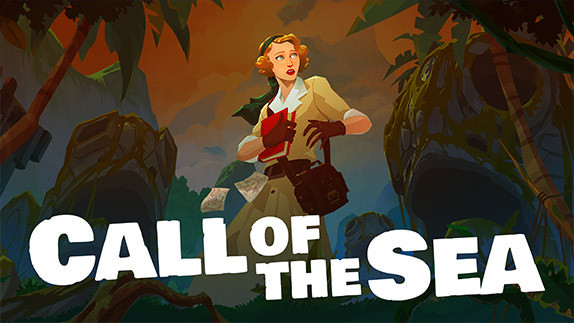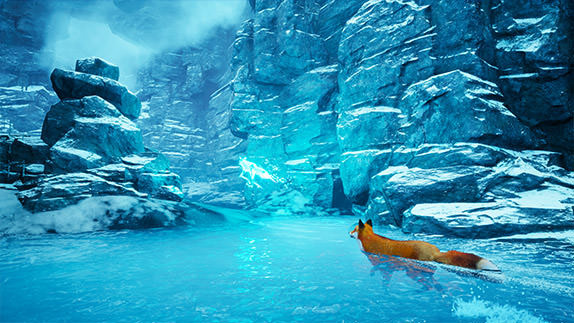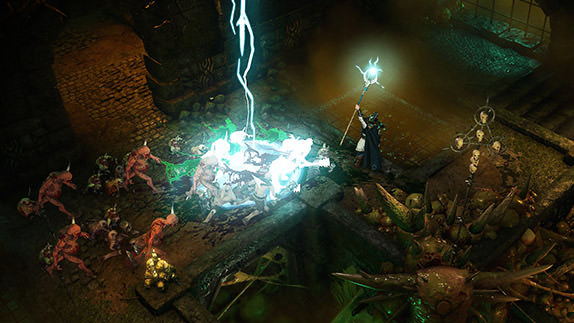Red Matter Review

 By Kevin Mitchell | Posted: May 29, 2018
By Kevin Mitchell | Posted: May 29, 2018
Although you remain silent throughout your adventure, the sheer number of ways you interact with the environment while developing the narrative in Red Matter is staggering. Focusing on interactive puzzle solving, you'll need to utilize the tools at your disposal to investigate an abandoned Soviet-like structure on Rhea, the second-largest moon of Saturn. In an alternate future, an ongoing cold war between the two superpowers, Atlantic Union and the People's Republic of Volgravia, forces your leadership to take action to recover confidential research information from your enemies. As expected, the mission is doomed from the start, as you uncontrollably plummet to the surface, suffer glitches in your equipment, and begin to see strange, mysterious things once you reach the facility.
As an exclusive title to the Oculus Rift storefront, indie developer Vertical Robot has implemented the Oculus Touch controllers perfectly. I've said it before, but these are without a doubt the best and, more importantly, the most immersive way to experience VR. This is taken a step further, as the controllers are fully rendered in-game, representing the primary tools you are handling in each of your hands. Depending upon what is needed, you can alter the appearance and utility of the devices, such as handling objects in the world, scanning the foreign Volgravian language (which appears to be a fake Russian dialect), and more. With outgoing communication broken, you are unable to communicate directly with your team but can respond to their questions based on your interactions with the environment. One of the earliest examples involves you loading a language data disk into your tool, letting you translate anything written into English.
Traversal in virtual reality games is always a point of contention within the community. Some revel in being able to smoothly move across environments the same way they would in any other game using a controller. This type of motion has proved to cause a disconnect between your mind and body, and many people experience nauseous or dizzying sensations. Games have gotten around this by implementing teleportation or by utilizing a "cockpit" of sorts to surround the player, which helps. Red Matter, by default, allows players to teleport to a new location using the thrusters on their boots, controlling the speed of the movement in the process. Before release, the developers added a smooth locomotion option, giving players a choice between the two systems. There are points in the game where you want to use the teleport, as you'll need to boost to higher elevations. There are plenty of other options to adjust the segmented turning and use of blinders.
Red Matter can be completed in a single session; however, I found myself taking breaks during the roughly four hours it took to complete the narrative. Much like the majority of adventure games released today, Red Matter focuses on player exploration and interaction. From paper notes, photographs, journals, etc., you'll gain an understanding of the world based on these non-essential items from those who worked/lived in the now empty facility. Naturally, those that take the time to examine every detail in the game will gain a better respect for the world Vertical Robot has crafted. As previously mentioned, Red Matter's core gameplay is the environmental puzzles. Early on, you may be tasked with repairing a broken conduit, requiring you to remove one from one door and place it in the power box of another. Using your grabbing tool, you can grab any nearby items that will fly towards you and be trapped in your grasp. You may need to find a code to gain access to a new location, typically found in a nearby piece of paper. One of my favorite interactions was trying to turn a rusty valve with both hands, requiring you to make slow, methodical motions, as if you are struggling. Think of any movie or piece of science fiction where a character needed to open a door valve while under pressure, and how it is almost 100% of the time stuck, requiring their full strength. It's a neat touch of realism to help elevate the game world. Not only that, but I found that using a 360-degree camera setup with the Oculus Rift was really beneficial, as you can turn around in real life and move around freely to help with the immersion.
Simply Put
Red Matter is an enjoyable and immersive adventure experience that takes full advantage of the Oculus Touch controllers. It's also a pretty good-looking title, and I didn't run into any issues running it on our studio PC with all the video options cranked to the limit. Right before release, Vertical Robot added additional locomotion options to appease everyone, something that not all developers have embraced. Personally, I didn't use the smooth locomotion options, as I really enjoyed using the boosters, but I did like knowing that both options are available. Red Matter has undoubtedly left an impression based on its world-building and interactions.
Note: Red Matter was reviewed on Oculus Rift. A digital copy of the game was provided by the publisher/developer.




